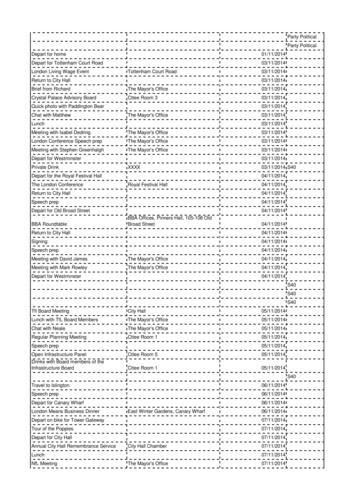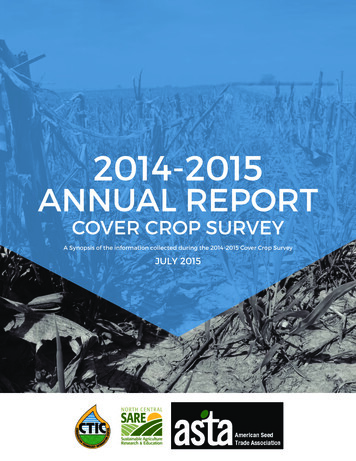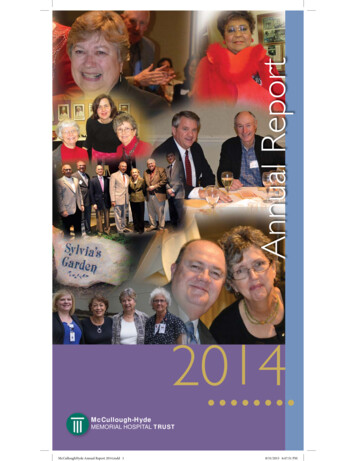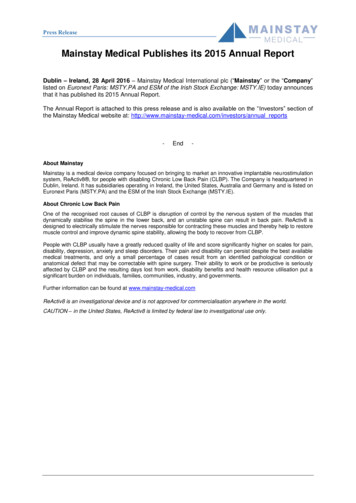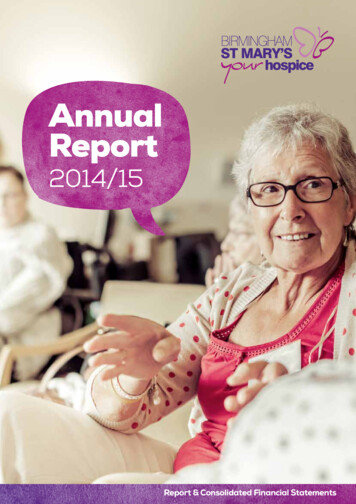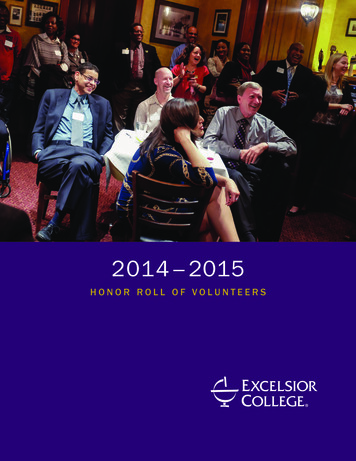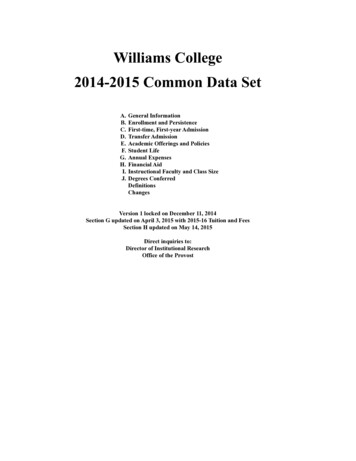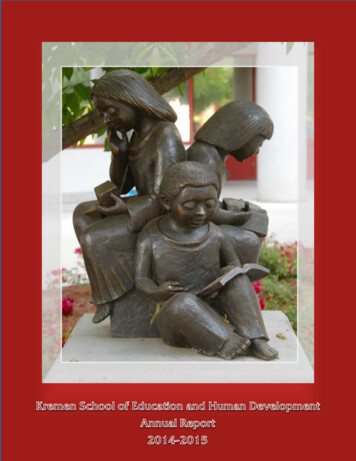
Transcription
Annual Report2014-2015
Kremen 2014-15 Annual Report22014-2015 Annual Report to the ProvostKremen School of Education and Human DevelopmentJune 15, 20151. Chancellor’s Office Six GoalsLiberal Studies Degree ProgramFreshman6-year Graduation Rate Goal4-year Graduation Rate GoalTransfer Students6-year Graduation Rate Goal4-year Graduation Rate Goal2-year Graduation Rate GoalFreshman Achievement Gap6-year URM/Non-URMGraduation Rate Gap4-year Pell/Non-PellGraduation Rate GapCSUBaseline RateF'07F'08F'09projectedCSU2025 he table above documents graduation for Liberal Studies, Kremen’s only undergraduateprogram, and the rate already exceeds the 2025 goal for full time first time freshmen (FTFTF)graduation rate. Likewise, the transfer student graduation rate already exceeds the aspirationalgoal. The Freshman Achievement Gap numbers are highly variable. Three years ago the URMstudents performed better than the comparison groups. Since then the percentages reversed andfor URM-Non-URM the scores worsened.The high graduation rates compared to the rest of campus are likely due our centralizedEducation Student Services Center (ESSC) that provides both intrusive and personalizedadvising so the students are clear on their pathway to graduation. This model is being emulatedelsewhere in the University.These figures are misleading however as to the effectiveness of the program in preparing thecandidates for a career in teaching, which is the goal of the major. With all the coursescontrolled by the various departments across the University and with over 70% taught by parttime instructors, there is no fidelity to the syllabi and students are not sufficiently prepared to beadmitted to the credential program despite the high graduation rate. As a result the majority ofgraduates are unable to pass the entrance examination for the credential program in MultipleSubjects, the California Subject Matter Exam for Teachers –MS. We are aggressively pursuing acorrection to this situation.We have just started the first full year of an anticipated five years of funding from the BechtelFoundation to better prepare Liberal Studies majors for teaching. This 240,000/year grant willallow the candidates to be placed in learning community type cohorts for three courses each
Kremen 2014-15 Annual Report3semester. Field experience in schools will accompany the courses. Instructors are receivingstipends to undergo training to infuse pedagogy into the content classes and course syllabi arebeing overhauled to ensure they contain the content necessary to be a teacher and to pass theexam. The various Deans and Department Chairs are expected to cooperate in assigninginstructors to cohorts and with scheduling of the learning community classes.2. New Hires in KremenPS aKyoungMariyaEmyLast rtmentEd LdrshpEd REC&IC&ISubjectK-12 Ed AdK-12 Ed ityHispanicArmenianWhiteNRChineseUnknownAm IndianWhiteWhiteAm IndianAsianAsianUkrainianHispanicKremen added 14 new, full time faculty for 2015-16, 12 tenure track and two lecturers. For thefirst year in memory, we had no failed searches. Both lecturers are from under-representedgroups. Of the 12 probationary faculty, five fall into groups traditionally considered diverse,however one other professor is Ukrainian and one is Armenian thus they also add to ourdiversity.For the 2014-2015 year Kremen had 46 full time tenure track faculty plus two administrators,nine faculty in FERP, and nine full time lecturers. The 66 faculty included 28 fromunderrepresented groups compared to 36 white, non-Hispanic.Next year there will be 80 faculty in the same categories, 35 from underrepresented groupscompared to 45 white, non-Hispanic, this is a 1% improvement.That said, this evaluation caused us to calculate “tenure density” for the first time. The resultswere shocking. For 2014-15, not including CalStateTEACH which is staffed entirely withlecturers, Kremen generated 2772 WTUs. This does not include the Deans or the CST Director,all of whom are full administrative. Examining all WTUs, 49% were full time faculty and 59%were part time lecturers. If one excludes the full time lectures who were actively recruited andemployed to be full time (Nan Barker, Susan Schlievert, Catherine Mathis, Mabel Franks, JanineQuisenberry, Virginia Boris, Kim Cole, & Susan Anderson) then 42% of WTUs are tenure track,58% are lecturers
Kremen 2014-15 Annual Report4This was a surprising finding. As mentioned above, 12 new TT faculty start in the fall alongwith two full time lecturers. It is clear however, that we have to re-examine our requests for newpositions for next year, particularly in the area of Counseling where we use the largest number oflecturers.Working the numbers, next year 53% of the WTUs should be by tenure track faculty, 47%lecturers. If we use full time faculty, then 56% of WTUs are covered. This will still be too low.3. Faculty and Staff DevelopmentFaculty are encouraged to improve in numerous ways. For example, following consultation withthe Bechtel Foundation, Fred Nelson, Cathy Yun, and Lisa Bennett were prompted to prepare thefunded grant to revise the Liberal Studies Major. Dr. Ignacio Hernandez was nominated for andsubsequently became a WASC Assessment Fellow in preparation for his role as Director ofAssessment for the Kremen School. Drs. Susana and Ignacio Hernandez were enrolled inleadership training. Dr. Sarah Lam is attending national leadership training in July.The majority of faculty development comes from workshops sponsored by the University or theKremen School or by attendance at conferences. The activities sponsored by Kremen areenumerated below.Faculty PD Workshops by Kremen Tech Services Faculty INTERESC 2014-2015The following eight days of workshop are trainings for Kremen faculty offered by our schooltechnology experts (Otto Benavides, Manuel Serrano, Fred Nelson)Access and Use of Box - August 29Video Production for Instruction - September 12NASA Educational Resources - September 26Video Production Workshop - November 21Integration of Technology in Student Centered Environments - four sessions for small groups orindividual faculty who needed to use room ED 157.Training/Conferences Hosted by KremenKremen School Mental Health Conference October, 2014Fresno State Social Justice and Mental Health Conference February, 2014CSU Systemwide Video Conference on preparing educators to be skilled in teaching EnglishLearners December, 2014Cesar Chavez Conference – Critical Discourse Analysis May, 2015Central Valley Educational Leadership InstituteAll Kremen faculty are invited to CVELI conferences and trainings, along with educationalleaders from across the valley. Our faculty are registered for half price, and the Dean’s Officepays that amount, so it is at no cost to those who choose to attend.Exemplary Practices Conference featuring Michael Fullan October 2, 2014Teacher Leader Seminar Series November 20, 2014, December 18, 2014, January 15, 2015 andMarch 5, 2015English Learners and the Common Core featuring Nancy Akhavan January 26 & 27, 2015
Kremen 2014-15 Annual Report5FAST TrainingFAST training is offered semi-annually in an organized fashion, on an as needed basis for newinstructors for courses in which FAST (Fresno State’s TPA) elements are embedded.Dandoy AwardsTwenty Kremen faculty members received research awards from the Maxima DandoyEndowment. Dr. Dandoy left over 1,000,000 to the school to be used at the Dean’s discretionfor either scholarships or professional development. The income from the endowment, theresearch dollars from the Provost, and 50% of the indirect dollars received from grants isawarded annual by a faculty committee based on written research applications from faculty. Thefunds can be expended on release time, summer stipends, student assistance, or research costs.Conferences Attended by Kremen Faculty at University ExpenseKremen expended 21,316 on in-state travel, 59,698 on out-state travel, and 79,932 oninternational travel for a total of 160,947 on faculty development in terms of attending trainingand conferences off campus. These included:National Conferences(City, Number different faculty if more than one)Washington, D.C. 12Chicago 11San Diego 5New Orleans 4Atlanta 3San Francisco 3Dallas 2Los Angeles 2PhiladelphiaScottsdaleForth WorthDallasUCLAHoustonBrooklyn, NYRaleighLouisvilleLong BeachMilwaukeeJacksonvilleArlington, VANewport, RIState and Regional ConferencesOver 120 in CaliforniaInternational ConferencesTaiwanTorontoSri LankaLima, PeruMexicoGuatemalaGermany
Kremen 2014-15 Annual Report6Other Travel/Professional Development13 different faculty traveled to Ecuador on two different professional development trips3 faculty traveled to Italy for Reggio Emilia training (the model on which the Huggins Center isbased)Staff DevelopmentKremen pays for books for staff that take university courses. This year four staff took advantageof this totaling 1433.Once per month, at least, Kremen holds staff team and community building events. Weparticipated together on the Ropes Course, including the staff and school leadership (deans,chairs, coordinators). We also have engaged in activities such as on designated Friday afternoongoing on the Amtrak to Hanford for ice cream and hold lunch/baby shower at the zoo, and even aone day trip to Disneyland as a reward for staff for their efforts with our last accreditation effortand as a reminder of customer service.Doctoral Program Specific Professional DevelopmentThe Kremen Doctoral Program in Educational Leadership works on a model that faculty receive4.5 WTUs for each 3 unit class taught plus receive 1.5 WTUs equivalent of “banked” money forprofessional development. For the past year, faculty banked 87,821 for professionaldevelopment. These funds are spent at the faculty’s discretion. Additionally, the DoctoralProgram funded 27,298 of travel for professional development.CalStateTEACH Program Specific Professional DevelopmentWe pay for CalStateTEACH professional development out of its budget. This year it included 80,000 in travel to seminars and conferences and 3,000 for training on the EdTPA that thisprogram uses for its TPA.The sum spent on faculty development, not including the on-campus training and workshops,was 359,066.4. College Advising UpdateThe Kremen School Student Services Center in ED 100 is the model that other schools andcolleges are using in the development of their advising center. The Center has been in place forover 15 years. The main change in that time has been the addition of paid graduate interns fromthe Higher Education Counseling masters degree. They have been utilized for intrusive advisingpurposes. Apparently other advising Centers on campus have adopted this model, putting ourinterns in high demand.Our Center is staffed by two full time advisors with Master’s Degrees serving as SSPs. We havea full time receptionist as well as a full time credential analyst, credential admissions specialist,and graduate admissions specialist. The three latter staff serve as advisors for students in areaspertaining to the role they fill, that is, being admitted to and completing the requirements for acredential program, a graduate degree, and/or a state professional education credential. Also
Kremen 2014-15 Annual Report7located in ED 100 is the Director of the Liberal Studies major, Dr. Susan Schlievert, whoreceives 6 WTUs release time each semester for coordination and student service.Each of the three basic teaching credentials, Multiple Subject, Single Subject, and EducationSpecialist have a coordinator who receives 3 – 6 WTUs per semester for recruitment andadvising of students as well as overseeing the program (Lisa Bennett, Nancy Akhavan, & ElisaJamgochian). Kremen has a full time, 15 WTU per semester, Director of Field Experience(Janine Quisenberry) to assist students with their placement into field experiences for the basiccredentials.Each master’s degree has a coordinator who receives 3 WTUs per semester for advising thegraduate students in their specialty. This includes School Counseling (Sarah Lam), MFT (KyleWeir), Ed Leadership (Linda Hauser), Higher Ed Administration & Leadership (SusanaHernandez), C & I (Carol Fry Bohlin), Reading (Steven Hart), MAT (Wally Ullrich), MultiCultural/Multilingual Ed (Tony Vang), and Early Childhood Education (Cathy Yun).There traditionally has been a full time director for the Teacher Internship Program paid throughself-support, this is being phased out with the Internship program being operated by our Office ofTeacher Recruitment, our self-support recruitment/employment center operated by Anne Murphyand Steve Price. That office also provides paid positions in schools for approximately 600students annually, as well as scholarships for 30 students.Another self-support program is Mini Corp, which provides support and employment for 60bilingual students who, in turn, provide instruction to the children of migrants in the CentralValley. These students are served by two full time staff; Jose Mejia and Lilly Lomeli.The Partner School Program provides advising to students, aside from Colleen Torgerson, itshalf time director, each cohort has a Liaison who receives 3 WTUs to provide support on site andsolve difficulties that come with housing each group of faculty and students in K-12 schools inour region between Porterville and Madera. The Liaisons (J. Bushman, J. Moosoolian, J. Mauer,E. Phillips, J. Behrend, and others) provide supervision, oversight and problem solving inaddition to helping plan the schedule, observations, and demonstration lessons.This kind of support and advising to students is obviously very expensive to the School, thoughnote that Internship, Office of Teacher Recruitment, and Mini-Corp have 100% external funding.The cost of Liberal Studies and credentialing plus the cost of supervision not covered by thebudget formula, and advising exceeds the Liberal Studies supplement and the EducatorPreparation pass-through annually, as will be discussed below.5. Budget and Carry Forward SummaryThe Kremen School budget includes three distinct programs: Kremen stateside, the DoctoralProgram in Educational Leadership (DPELFS), and CalStateTEACH (CST). Both DEPLFS andCST are self-support and each has its own separate and distinct budget. We do not co-minglethese program funds with the Kremen stateside operation. While Kremen stateside would beresponsible for shortfalls in the other two, and in fact was held responsible when there was
Kremen 2014-15 Annual Report8deficit in CST some years ago, Kremen is not free to expend those funds at will. Consequently,this report will treat each of the three programs separately with each program having a carryforward amount and spend-down plan.That said, if not for benefit of having the two additional programs to pay for certain allowableexpenses, Kremen stateside would have no carry forward and would be in a deficit budgetposition. Having some flexibility has allowed us to not only have outstanding programs andfacilities for students served by all three programs, but also to share resources across theUniversity. For example, Kremen paid all the costs of establishing the graduate writing centerand contributes to the Madden Library, transferring 65,000 in this budget year alone. Over thelast five years, the total amount has exceeded 500,000 to the library, graduate services, andfinancial aid.While Kremen stateside receives supplements of 155,000 for Liberal Studies and 582,000 forEducator Preparation pass through, the school spends over 1,000,000 on staff for LiberalStudies, credentialing, admissions, and field supervision not covered by the new budget formula.The result is a continual deficit that is only partially ameliorated by salaries and expensescovered by the other two programs.The Kremen School Stateside Carry Forward Amounts Last Five 19,396588,069
Kremen 2014-15 Annual Report9SummaryLeft alone, the Kremen stateside carry forward would be close to zero in a year if not for sharedexpenses by the other two programs. As the new on-line doctoral program is in its first fewyears, the costs will be substantial, decimating that carry forward. It is also apparent that therewas a miscalculation in the budget formula that overpaid the Doctoral Program in the past andthat situation will be remedied.The CST carry forward is substantial. Their faculty ratios will be adjusted, five new faculty werejust added for next year. Additionally, CST is covering the complete cost of new equipment andremodeling for two computer classrooms in the Education Building. While CST does use them,by far the biggest benefit will be for other educator preparation programs.To help with recruitment in the educator pipeline, CST has committed to providing tablets for thestudents who enroll in the Liberal Studies cohorts that are being initiated in 2015. This sizable
Kremen 2014-15 Annual Report10expense will not fall on other university donors who support the President’s DISCOVEReinitiative even though the learning communities developed will be part of that project.Professional Challenges/AccomplishmentsThe faculty of the Kremen School were presented with a list of 11 challenges/goals for 20142015 in August 2014. The top five are listed below in the rank order, with the mean ranking foreach goal in parentheses, next to the rank. As may be seen, the top goals were ranked veryclosely in terms of importance.1. (3.5) Proactively plan to deal with the growing teacher shortage, the immediate growthof internships, and the exit of student teachers from the traditional program intointernship. Develop funding streams to support the needed supervision and support forinternship.ResponsesContinued development of new partnerships which were expanded to Porterville and their 9career pathways and also focused on a rural district in Washington Union. New partnerships inClovis and Madera will start in fall.Funded for five years, a 8M Teacher Quality Partnership grant with Fresno Unified, focusing onbetter preparing 300 teachers in the content of science and math for all levels P-12 throughTeacher Residencies.Received the first year of a 240K/year, five year grant from the Bechtel Foundation to revampthe Liberal Studies major. The major is not serving students well, other than obtaining very highgraduation rates. The students are unable to pass the entrance exam for the Multiple Subjectprogram despite obtaining high GPAs in the major.Worked with Fresno Unified to continue the Pipeline to Teaching Project, particularly focusingon recruitment of males of color into teaching, and continuing work on teachers for specialeducation, science, and math.2. (3.6) Need to institutionalize Co-Teaching, the Common Core State Standards, the NextGeneration Science Standards, and Linked Learning into the courses of the basiccredential programs, Ed Leadership, and School Counseling.ResponseContinued faculty development on standards. All faculty were invited to attend multipleworkshops and training on Common Core including all training provided to Fresno Unifiedleaders. Co-teaching training is provided each semester to master teachers in the districts and ourcandidates. The Single Subject program was revised to include Linked Learning activities andassignments in each course; this will be reviewed in 2015-16. Coordinators will continue toreport on this item at Coordinating Council meetings.
Kremen 2014-15 Annual Report113. (3.8) Maintain diverse hiring practices in Kremen and successfully fill the tenure trackvacancies approved for 2014-15.ResponseKremen had its most successful recruiting year, hiring 12 probationary faculty and 2 full timelecturers. Additionally we converted one lecturer to 80% teaching by moving administrativeduties related to Internships to the Community Based Programs office. Of the 14 full timefaculty, 8 are from underrepresented groups, 11 are female. This includes 2 Native Americans, 1African American, 3 Asian, and 2 Hispanic faculty. Of the 6 remaining, 2 are of unknownethnicity, 1 is Armenian and 1 is Ukranian. While not meeting the official designation ofunderrepresented, these two add to the diversity of our faculty.4. (5.5) Seek support for Fresno Family Counseling and to assist its move to a safer, moreconvenient location.ResponseFresno Family has yet to move to a safer, more convenient location. At three different timesspace has been found but the owners have chosen other tenants despite our offer to meet theirprice. With greater demand than space available, owners are not anxious to take as tenants anagency serving individuals with mental health issues.On our behalf, the Foundation is currently negotiating on a property just down Shaw from theUniversity. We are attempting to lower the price and have asked for a three-year lease instead offive because of the high rental cost. We do not have money in hand to cover the rent for thosethree years however our development staff is working furiously on this. As this report issubmitted, John Milikian is negotiating the lease on our behalf with the landlord of the property.5. (5.6) Complete research, in collaboration with Institutional Effectiveness, on the effect ofthe new CAEP standards, DOE standards, and NCTQ on the supply of teachers and thediversity of teacher candidates. Collaborate with the CSU Education deans to continueconsideration of involvement with CAEP. Consult with the faculty to consider theproposed California Advanced Accreditation Academy.ResponseThroughout the year, significant interest in this research has been generated. In response, CAEPand the CTC have been negotiating a state agreement. CAEP proposed to the CTC in Californiathat the CSU’s would not be held to the questionable standard on selectivity (Std. 3.2) that wouldrequire our candidates to have a composite SAT score at the 50%ile this year raising to 67%ileby 2020. The non-CSU schools in California would still be held to that standard.The CTC refused that compromise because it would be treating the CSU differently than theother 60 campuses preparing teachers. The counter proposal, at the CSU Education Deans’
Kremen 2014-15 Annual Report12suggestion, was that campuses that only admit post bacs to credential programs would beexempt. For us, this means we simply make graduation a condition for final student teaching. Itwould affect none of our students and exempt us from the standard.As Dean, this is not really a satisfactory solution in that the standard is wrong and unfair,exempting us from it only means others have to fight the battle. Concurrent with thiscompromise, CAEP fired its President, Jim Cbulka, replacing him with Chris Koch. We haveinvited Dr. Koch to TECSCU/TRG in San Antonio in October. We look forward to aconversation with him.The Teacher Educator has accepted one article on selectivity, focusing on NCTQ that wesubmitted. A second article, focusing on CAEP, is in revision.The data has been presented to the CSU Education Deans, the CTC, and the Department ofEducation. AACTE Governmental Relations has handed the articles to Secretary Duncan andUndersecretary for Post-Secondary Ted Mitchell. It has been presented at conferences ofTECSCU, the Renaissance Group, and has been submitted to be a major forum at AACTE in LasVegas next spring in collaboration with other CSU deans.Summary Narrative of Accomplishments for 2014-2015Singular Accomplishments2014 Christa McAuliffe Award for Exemplary Educator Preparation. 8M Teacher Quality Partnership Grant from the U.S. Department of Education for work in theFresno Unified Teacher Residency partnership. 240,000/year grant from the Bechtel Foundation to revise the Liberal Studies pipeline toeducator preparation.Accreditation from the National Council for the Accreditation of Teacher Education/Council forthe Accreditation of Educator Preparation with no weaknesses or needs for improvement.Accreditation from the California Commission for Teacher Credentialing with no weaknesses orneeds for improvement. 60,000 grant from Bechtel Foundation for Common Core training for educators.ScholarshipTracz, S., Torgerson, C., & Beare, P. (2015). The NCTQ selectivity standard and principalevaluation of teacher preparation. The Teacher Educator. (accepted)
Kremen 2014-15 Annual Report13Chiero, R., Beare, P., Marshall, J., & Torgerson, C. (2015). Evaluating the effectiveness of elearning in teacher preparation. Educational Media International Special Issue- ICEM 2014.(accepted)Beare, P., Torgerson, C., Marshall, J., Tracz, S., & Chiero, R. (2014). Examination for bias inprincipal ratings of teachers’ preparation. The Teacher Educator, 49, 75-88.Four other manuscripts from my sabbatical are in process or under consideration.PresentationsMarch 27, 2015March 1, 2015February 27, 2015October 1, 2014University de Las Americas“Promotion of Multicultural Education and the Cultural Competency ofUniversity Faculty.”Quito, EcuadorAmerican Association of Colleges for Teacher EducationAnnual Conference. “Advancing the Imperative: The Next Level ofPartnership between IHEs and PK12.”Atlanta, GATeacher Education Council of State Colleges and Universities AnnualConference. Keynote address: The 2014 Christa McAuliffe Award forExemplary Education. “The Central Valley Partnership for ExemplaryTeaching.”Atlanta, GATECSUC/The Renaissance Group Annual Conference,“Invalid Standards in Educator Preparation Assessment.”Washington, DCService Activities Off CampusCSU/Bechtel Educator Preparation Initiative, Member, 2014-2015.Member, Accreditation Committee, California Commission on Teacher Credentialing, 20142015.Proposal Reviewer: 2015, 2016 Annual Conferences, AACTE.Teacher Education Counsel of State Colleges and Universities, (TECSCU) GovernmentalRelations Representative to AACTE and Member, Executive Committee, 2012-2015.Member of Executive Committee, California State University Deans of Education, 2007-2015.Chair of Assessment Committee 2011-15.Chair, University High School Board of Trustees, 2010-15, Member 2005-15.Board of Governors, The Renaissance Group, 2008-15.
Kremen 2014-15 Annual Report14Board of Directors, Sierra Foothills Conservancy, 2009-2015.Board of Directors, Springboard Schools, 2005-09; Pivot Learning Partners, 2009-2015.Community Volunteer, Miami Public Schools, spring 2015.Manuscript reviewer: The Teacher Educator; Journal of Teacher Education; EducationalRenaissanceSummary rating: It is a rare event for a school of education to have a year as good as we had in2014-2015. In particular, it was amazing to experience the Christa McAuliffe Award,accreditation results for all our programs, hire 12 new tenure track faculty, and receive the TQPgrant for our signature program. If this was not an outstanding year, it would be impossible todefine what that would constitute for us.
Kremen 2014-15 Annual Report152014-2015 Annual Report to the ProvostKremen School of Education and Human DevelopmentDepartment ReportsGoalsDepartment of Counselor Education and Rehabilitation1. Report on previous years goals.a) The search for a K-12 School Counseling and a Student Affairs & College Counselingtenure-track positionb) Outcome: The goal was accomplished. Both positions were filled and the new hires willstart in Fall 2015.c) Implement an MA in Education: Option in Counseling & Student Servicesd) Outcome: The goal was accomplished. The first group of international students fromNational Changhua University of Education from Taiwan has finished their first year inthis MA in Education program.e) Increase the funding capacity of Fresno Family Counseling Centerf) Fresno Family Counseling Center received a 20,000.00 grant from the KaiserCommunity Foundation with some of these funds being used to offset supervision cost.FFCC also reduced the number of paid interns and has only accepted volunteer positionssince Fall Semester of 2014. Finally, MFT Interns who are employed will becontributing more from their sessions to support the center's operating cost.g) Pursue online MA program in Human Developmenth) Outcome: Dr. Weir worked on the needs assessment for this program this year.i) Rehab program address the changes pursuant to the merger of the CORE and CACREPaccrediting bodiesj) Outcome: The Rehab program has moved along with the proposal for name change forthe Rehab program into Rehabilitation Counseling and Mental Health as an integral steptoward merging CORE and CACREP accreditation2. Continued goals from previous years.3. New goals.a) The search for MFCC position to fill the position vacated by retiring Dr. Juan Garcia.b) The search for Rehab position to meet the capacity needs for faculty.c) The move of FFCC to a new facility for safety and increased capacity for services.d) During the Fall 2015 semester, the director will be developing a Business Plan, DonorBrochure, and Grant Template with the hope that these efforts will lead to additionalfunding streams for the center.e) Continue to pursue the online MA program in Human Development.f) Pursuing the launching of Clinical Mental Health program.g) MFT Interns who are employed will be contributing more from their sessions to supportthe cen
Kremen 2014-15 Annual Report 2 2014-2015 Annual Report to the Provost . Kremen School of Education and Human Development . June 15, 2015. 1. Chancellor's Office Six Goals
